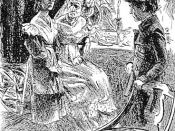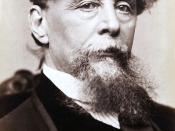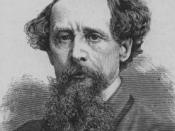Charles Dickens manages to combine in his works wonderful story-telling, humour, pathos and irony with severe social criticism and acute observation of people and places, both real and imagined. His "Hard Times" and "Great Expectations" are good proof for the above statement. Both are written in the second period of Dickens' literary career, a period marked with pessimism, cynicism and indignation.
Dickens demonstrates exactly that dark truth for the period in his two novels. He achieves his precise observation and representation of truth through non-realistic and symbolic strategies as well as through realism.
"Hard Times" begins with a short introduction. The scene is a classroom in which Dickens' depicts the important themes of his 'hard times'; a contemporary debate on the nature of learning, education and knowledge. The narrative content is pretty short but its imagery is very intense. The description of the classroom is definitely a satire, criticism on utilitarianism and similar philosophies that suggest facts to be more important that imagination.
As the speaker exclaims "Now, what I want is Facts!", the teacher believes that the formation of the child's mind is rooted in the study of facts. The novel is divided into three 'books': Sowing, Reaping and Garnering. The symbolic agricultural motif shows the truth about the utilitarian philosophy used in education. The names of the parts are the phases that every farmer knows to be necessary for the growing of crops; only the case here is growing facts in the child's mind.
Similar to "Hard Times" Dickens' later novel "Great Expectations" is divided in three parts. Only here the different parts represent the three phases of the protagonist's expectations. Being a retrospective, autobiographical, realistic fiction with moral focus "Great Expectations" may be called a bildungsroman. The bildungsroman begins with the voice of the old Pip who...


